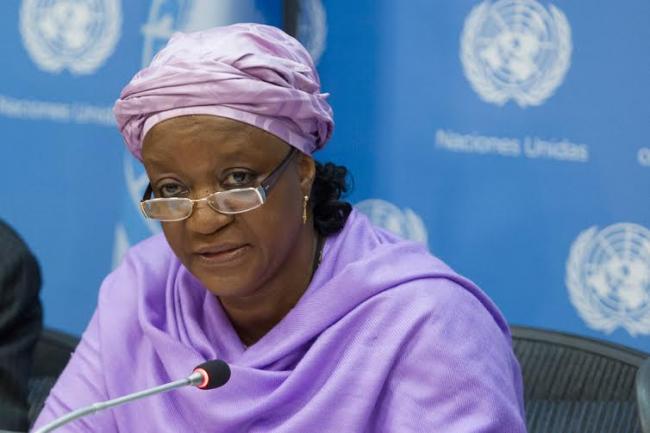15 Apr 2015, 06:27 am Print

“We have made tremendous progress in the last few years, but we must redouble our efforts in the face of new threats,” Zainab Hawa Bangura told journalists at a UN Headquarters briefing this afternoon, which coincided with the one-year anniversary of the abduction by Boko Haram of 276 school girls in Nigeria.
She urged the international community to renew its commitment and apply increased pressure so as not to lose the ground we have gained and to meet the demands of new and emerging threats. To garner this support, Bangura will present the Secretary-General’s 2015 report on Conflict-Related Sexual Violence to the Security Council tomorrow.
The report, documenting horrendous crimes committed in conflict zones around the world between January and December 2014, identifies some 19 countries and lists 45 armed groups suspected of committing these crimes, including state forces, opposition groups and violent extremist groups.
The report chronicles the disturbing trends of new and emerging non-State actors, listing some 45 armed transnational groups suspected of rape and other forms of sexual violence.
Crimes committed by non-State actors who may not follow the same rules of engagement and may not respond the same penalties. They also subjugate women as a “tactic to terrorize” and their use of modern day technology to advance mediaeval beliefs is alarming because social media helps them get their message out.
“Our opponents are brutal and relentless. They are cunning and even if we relax for a moment they may gain the upper hand,” said Bangura, calling on the international community to find new ways to deal with the emerging threats and warning against a “culture of denial and silence.”
Governments where the crimes occur must foster national ownership and leadership of solutions. In 2014, some countries progressed on the issue.
In its recommendations, the report underscores the need for broader efforts to strengthen institutional safeguards against impunity. For example, in the past year military and police officers in countries covered by the report have been indicted, prosecuted, and convicted on charges of conflict-related sexual violence.
It is also critical to increase medical, psychosocial, legal and economic services and support for survivors so that they can rebuild their lives. National and regional early warning systems that sound the alarm against escalating sexual violence should be adopted to help prevent these atrocities before they occur.
“A country that does not respect women in peace time will not protect women in conflict. Change the dynamics and change the opportunity for women,” Bangura declared.
In a recent interview with the UN News Centre, she stressed that the countries where these crimes are being committed have to make sure they have the political will and commitment. “The donors who are supporting them need to make sure they provide the resources to support these countries so that they take the necessary action,” she added.
Photo: UN Photo/Loey Felipe
- Massive terror blitz in Pakistan: 10 security personnel, 58 militants killed in Balochistan
- Dance, music — then death: Suicide blast rips through wedding in Pakistan
- Baloch leader slams Pakistan’s Gaza peace role, says country 'deserves' Operation Sindoor 2.0
- Revenge in Syria: U.S. eliminates terrorist behind December 13 ISIS attack
- Pakistan horror: Karachi mall inferno kills six, firefighter among dead





-1763561110.jpg)
